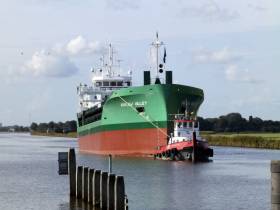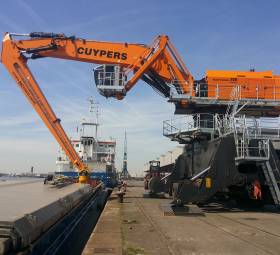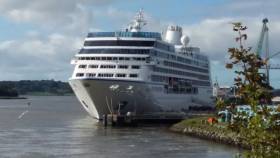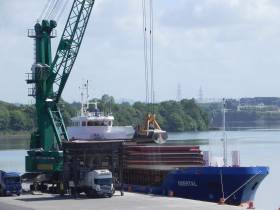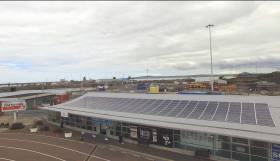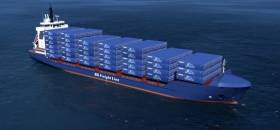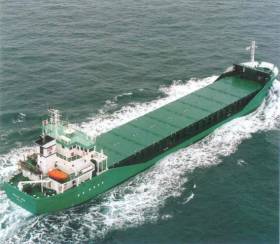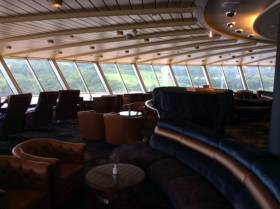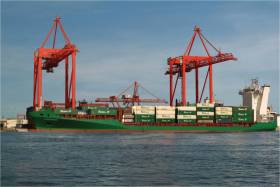Displaying items by tag: Ports & Shipping news
Ferry Due from Wicklow Yard While Arklow Dutch Built Cargoship Makes Sea Trials
#SeaTrials - As a new car ferry is to be launched in Co. Wicklow yard as previously reported, an Arklow Shipping Dutch flagged and built cargoship is making first sea trials today, writes Jehan Ashmore.
The Royal Bodewes newbuild no 724, Arklow Valley, a cargoship with a modified bow design compared to her more distinctive sisters to improve energy efficiency, had been transported yesterday under tow. This involved a pair of tugs to take the near 87m long newbuild from the inland shipyard near Groningen to Delfzijl.
Further along the coast at Eemshaven, is where Arklow Valley had sailed to and this afternoon the newbuild was in the open sea off the Western Frisian Islands in the North Sea.
She is the fourth so far completed from 10 in a series of 5,100dwat Bodewes Traders on order to ASL. They will be part of Arklow Shipping Nederlands B.V. with an office located in Rotterdam.
The new series or ‘V’ class are all Dutch flagged and began with leadship, Arklow Vale. The single hold vessel was launched and named just over a year ago, by ships godmother, Mrs Mari Louise de Jong.
ABP Invest In World's Largest Hydraulic Crane for Merseyside Port
#NewPortCranes - The Merseyside Port of Garston located south of Liverpool is one of five Associated British Ports (ABP) to have ordered new hydraulic cranes worth £6m across the UK ports group.
The five Mantsinen hydraulic cranes have been purchased by ABP also for their ports of Swansea, Wales and the English ports of Teignmouth, King’s Lynn and Ipswich (see report).
When the Mantsinen 200M is installed at the Port of Garston, this will be the world’s largest hydraulic crane. The 280 tonne crane will also be the first 200M to be located in the UK.
A 90M wheeled machine has been ordered for the Port of Teignmouth and two near-identical 120M will be delivered to the ports of Swansea and King’s Lynn. An order for a 95R tracked machine has been placed for the Port of Ipswich.
ABP Short Sea Ports Director Andrew Harston said: “ABP is dedicated to putting our customers first. That is why we are continuing to invest in brand-new equipment and technology to ensure we can offer our customers the highest possible standards of service and innovative solutions.
“We have been pleased to work with Cooper Specialised Handling. Each port has its own handling needs dependent on vessel sizes, load commodities and in some cases, very specific ground loading requirements.”
Tony Rooney, Managing Director of Cooper Specialised Handling, was keen to clarify the methodology of the process, saying: “This wasn’t a single contract for five machines, but rather five individual contracts each involving the provision of one crane.
“The five ABP sites had complete freedom of choice in terms of their handling solution and we are delighted that, completely independently, each port selected Mantsinen as its preferred equipment.”
Cooper will begin delivering the cranes from next month.
A Nautical Caller Marks Final South-East Seasonal Visit
#FinalCaller - Nautica became the final cruiseship caller of the season to visit the Port of Waterford, writes Jehan Ashmore.
Oceania Cruises which operates the cruiseship which has undergone a multimillion dolar refurbishment had berthed at Belview on Monday.
The facility 5kms downstream of Ireland's oldest city is the main terminal for the port, which launched last week a business plan looking forward to 2020.
The 30,000 tonnes ship had called with a capacity for 684 passengers. Accommodation consists of 342 luxurious suites and staterooms, nearly 70% of which feature private verandas.
Guests visited the attractions of the south-eastern region in which a total of 16 calls were made this season.
The cruiseships calling at Waterford Estuary asides using Belview, also docked at the city quays and at anchorage off Dunmore East.
World Maritime Day Forum - Debate on Global Shipping's Future Challenges
#WorldMaritimeDay - The IMO's World Maritime Day theme for 2016 is "Shipping: Indispensable to the World".
The event forum takes place on 29 September and will include a debate at the International Maritime Organisation (IMO) headquarters in London.
The moderator is Julian Bray and panellists are: Karin Orsel, Alistair Lindsay, Rear Admiral Chris Parry CBE and Hassiba Benamara
The theme was chosen to focus on the critical link between shipping and global society and to raise awareness of the relevance of the role of IMO as the global regulatory body for international shipping. The importance of shipping to support and sustain today's global society gives IMO's work a significance that reaches far beyond the industry itself.
According to the United Nations Conference on Trade and Development (UNCTAD), around 80 per cent of global trade by volume and over 70 per cent of global trade by value are carried by sea and are handled by ports worldwide. These shares are even higher in the case of most developing countries. Without shipping the import and export of goods on the scale necessary to sustain the modern world would not be possible.
Seaborne trade continues to expand, bringing benefits for consumers across the world through competitive freight costs.
There are more than 50,000 merchant ships trading internationally, transporting every kind of cargo. The world fleet is registered in over 150 nations and manned by more than a million seafarers of virtually every nationality.
Over the past 50 years and more, IMO has developed and adopted a comprehensive framework of global regulations covering maritime safety, environmental protection, legal matters and other areas. Under this regulatory framework, shipping has become progressively safer, more efficient and more environment-friendly.
The event will be streamed live, click here
You are also invited to take part via Twitter using the following handle and hashtag: @IMOHQ #WorldMaritimeDay
World Maritime Day celebrations
World Maritime Day 2016 will be celebrated at IMO Headquarters on the banks of the River Thames on 29 September, but other events and activities focusing on the theme will be held throughout the year.
Parallel Event 2016
The World Maritime Day Parallel Event will be held in Turkey in November 2016.
Visit www.worldmaritimedayturkey.com/ for further details.
Port of Waterford Sets Out Business Plan on Bicentenary
#BusinessPlan - The south east Port of Waterford is to increase it's annual revenue by almost a third over the next four years, reports WLR FM.
The Waterford Harbour Board celebrated it's bicentenary this week with an event held in City Hall, during which the port's business plan for 2020 was revealed.
It sets out a strategy for growth at the Belview facility through a €7 million investment into capital projects, infrastructure and services.
Frank Ronan is CEO of the Port of Waterford Company says it's hoped that will yield an increase in revenue of €3 million over four years
Solar Support Deployed at Stena's Port of Holyhead
#SolarPort - As part of a drive to become the world’s greenest ferry operator, Stena Line has just delivered an innovative solar project at its Port of Holyhead in Wales.
The project involved the fitting of four 50kWp Solar PV panel arrays to the roofs of terminal buildings, garage and shore shop. Stena Line teamed up with Eco Environments Ltd, a grid-connected and off-grid power specialist. The project was completed on time and on budget over a 4-week period during the summer with no interruptions to the port nor business to daily ferry operations.
The energy efficiency stats and associated carbon reduction levels around the project are impressive. It estimated that the panels will saved approximately 89 432 kg CO2 annually, provide 164 400 kWh of electricity for use onsite and will provide a yearly benefit worth £27,276 in electricity savings together with additional government feed-in tariff revenue. The pay back for the system is estimated to be less than seven years.
Wyn Parry, Stena Line Port Manager, Holyhead, said: “This is a very innovative and exciting project for us to be associated with. Initiatives like this one point the way forward and, as a company, we need to focus on it if we are to achieve our vision of becoming the greenest ferry operator in the world. While the savings themselves are relatively modest from a financial perspective, if we look at this as a small project within a much more comprehensive approach to future sustainability then I think it’s an important step forward and one that I’m sure can be easily replicated across other parts of the Stena Line and wider Stena Group businesses.”
Shipping Review: Multicat at Mooneys, BG's New Irelanders, Wicklow Port Transfer & More
#ShippingReview - Jehan Ashmore reviews the shipping scene among the following stories over the last fortnight.
Multicat workboat, Sgt Pepper which carried out mooring duties for the RNLI Dun Laoghaire during the summer, underwent maintenance at Mooney Boats, Killybegs, Co. Donegal.
Container operator, BG Freight Line orders new class of ‘Ireland’ max tonnage optimised for the company’s Irish Sea hub feeder services.
Minister for Transport, Shane Ross has signed an Order transferring Wicklow Port Company to Wicklow County Council, the first port to transfer under the National Ports Policy.
Irish Continental Group (ICG) container subsidiary Eucon and terminal divisions, increased first-half year revenue by 9.8% to €62.8 million (2015: €57.2 million).
Arklow Shipping's shipbuilding spree to replace ageing tonnage has led to one of the oldest ‘R’ class short-sea cargoships, Arklow Rose disposed to UK owners based in Cardiff, Wales.
Irish-Dutch Cargoship Sold to UK Owners Based in Wales
#ShipSold - As Arklow Shipping continue a shipbuilding spree to replace ageing tonnage, one of their oldest ‘R’ class short-sea cargoships has been disposed, writes Jehan Ashmore.
Built in 2002 the Arklow Rose of 2,999 gross tonnage which as previously reported on Afloat.ie was at Cork Dockyard, Rushbrooke, part of the Doyle Shipping Group (DSG), has since been renamed Celtic Venture.
Of the near 50 strong joint Irish-Dutch flagged fleet (that includes deepsea bulkers), the 90m Arklow Rose was registered in Rotterdam where ASL’s division, Arklow Shipping Nederland B.V. is located.
The cargoship has transferred flag to the UK for owners, Charles M. Willie & Co. (Shipping) Ltd of Cardiff, Wales. The shipowner, managers and charterer company was established in 1912 with origins as coal exporters and timber (pit props) importers.
Having been alongside Cork Dockyard’s layby quay since 20 August, the vessel has re-entered the graving dock yesterday and where among the work been carried out is on the propeller blades.
Also confirmed with the new owners in that a former Celtic Venture in March was sold to Turkish owners. Afloat.ie has monitored the vessel this week in the Mediterranean which sails as Tahsin Imamoglu with a port of registry in Istanbul.
In between Arklow Rose drydocking and her return under a new name, was the Naval Service flagship HPV LE Eithne (P31) which vacated the facility also yesterday.
Holland America Line Makes Homage Atlantic Anchorage
#GalwayAnchorage – Holland America Line’s Prinsendam continues her 28 Day Celtic & Bourgundian Explorer Cruise with an anchorage call on Galway Bay today, writes Jehan Ashmore.
Prior to the cruiseship's arrival off Galway Port, Prinsendam so far has visited Dublin, Belfast (as reported), the Scottish western isles and Killybegs yesterday.
She has a capacity for 766 passengers and 460 crew and in which cruisegoers are been tendered ashore to the City of the Tribes. The US company founded in 1928 has a history of trans-Atlantic 'liner' calls taking anchorage in Galway Bay.
During the careers of their Maasdam and Ryndam this required the use of a dedicated liner tender, Calshot which HAL purchased in 1964 through a subsidiary, Port & Liner Services (Ireland) Ltd.
Prinsendam is the final caller out of six cruiseships this season, however Galway Harbour Company have scheduled in for 9 calls in 2017. Again this will include HAL's Prinsendam, at 38,848 gross tonnage which is deemed small these days. Much larger cruiseships are planned as the port have proposed an outer deeper water port which would not require anchoring off Mutton Island.
In the meantime, at the entrance to Galway on the outer pier is where a fleet of the cruiseships tenders are ferrying visitors back and forth. On the adjacent berth is LastMara Teo’s freight-only Aran Islands serving vessel, Bláth na Mara, whose fleetmate Chateau-Thierry transported generators from Rossaveal during power cuts on two of the three islands.
Also berthed but alongside the quays of the Claddagh area is the former Commissioners of Irish Lights Dun Laoghaire Harbour based buoy-towage tender Puffin.
The Bristol built tug retains its original name having been acquired in 2011. Afloat two years later made a trip on board Puffin, which also carries out ship mooring lines-boat duties along the Shannon Estuary. On that occasion, this involved a repositioning passage from the Rusal Aughinish Alumina plant jetty to the Port of Foynes.
ICG Container and Terminal Divisions Half Year Results
#Containers - Irish Continental Group (ICG) container subsidiary Eucon and divisions operating terminals in Dublin and Belfast ports, have released half-year results for 2016.
Revenue in the division was up 9.8% to €62.8 million (2015: €57.2 million), EBITDA increased to €6.6 million (2015: €5.5 million) while EBIT rose to €5.4 million (2015: €4.1 million).
Total containers shipped were up 7.4% at 152,700 teu (2015: 142,200 teu).
Containers handled at the Group's terminals in Dublin Ferryport Terminals (DFT) and Belfast Container Terminal (BCT) were up 39.6% to 144,800 lifts (2015: 103,700 lifts). DFT's volumes were up 5.0%, while BCT's lifts were up 149.3%.
The increase in Belfast arises from the commencement in June 2015 of the Services Concession to BCT for the operation of a combined container terminal at Victoria Terminal 3 (VT3).
Containership, MV Ranger remains on time charter to a third party and is currently trading in north-west Europe while MV's Elbtrader, Elbcarrier and Elbfeeder remain on time charter to Eucon.



























